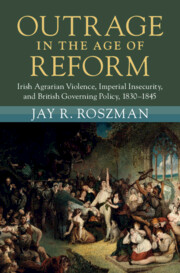 Outrage in the Age of Reform
Outrage in the Age of Reform Published online by Cambridge University Press: 15 September 2022
In early March 1839 Lord Roden, the ultra-Tory and de facto leader of the Irish peers, proposed the formation of a select committee to inquire into Irish outrages. The start date of the proposed committee’s purview – 1835 – conspicuously corresponded with the beginning of Lord Mulgrave’s tenure as lord lieutenant, a period Roden identified with ‘tears of sorrow and streams of blood’. The committee, discussed in greater detail below, was the culmination of the Tories’ strategic effort to make Ireland – and particularly Irish agrarian violence – a rallying point to topple the Whig government of Lord Melbourne. Speaking before the House of Lords, Roden noted the ‘conspiracy in Ireland – a conspiracy systematic, organised, and secret … which was directed against the life and property of all who would not join it and support the treasonable objects which its members had in view’. Highlighting the alleged role of Ribbonism in coordinating a campaign for ‘the annihilation of the Protestant faith’, Roden peddled sectarian narratives stoking anti-Catholic sentiment and that connected Irish outrages to the political programme of O’Connell, which Roden argued received support from the Whigs in power.
To save this book to your Kindle, first ensure [email protected] is added to your Approved Personal Document E-mail List under your Personal Document Settings on the Manage Your Content and Devices page of your Amazon account. Then enter the ‘name’ part of your Kindle email address below. Find out more about saving to your Kindle.
Note you can select to save to either the @free.kindle.com or @kindle.com variations. ‘@free.kindle.com’ emails are free but can only be saved to your device when it is connected to wi-fi. ‘@kindle.com’ emails can be delivered even when you are not connected to wi-fi, but note that service fees apply.
Find out more about the Kindle Personal Document Service.
To save content items to your account, please confirm that you agree to abide by our usage policies. If this is the first time you use this feature, you will be asked to authorise Cambridge Core to connect with your account. Find out more about saving content to Dropbox.
To save content items to your account, please confirm that you agree to abide by our usage policies. If this is the first time you use this feature, you will be asked to authorise Cambridge Core to connect with your account. Find out more about saving content to Google Drive.